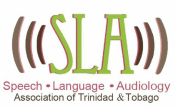What should I do if I am concerned about my child's speech and language development?
Do you suspect your child has delayed speech/language?
Common concerns include:
Do you suspect your child has a hearing problem?
Common concerns include:
Common concerns include:
- infant is not babbling/imitating sounds at 12 months
- limited vocabulary compared to other children their age
- not combining 2 or more words at 2-3yrs old
- “my child is not talking”
- child mostly uses gestures rather than words to get parents’ attention, request an object or express a desire
- words sound like 'gibberish'/not easily understood
- child is not able to carry on a conversation or answer who/what/where questions at 3-4yrs old
Do you suspect your child has a hearing problem?
Common concerns include:
- not always responsive to name when called
- not able to follow simple verbal commands unless gestures are used
- may not startle to loud sounds/turn to find sounds in the environment
- appears to be reading lips
- frequent ear infections/congestion
- listens to music/TV at a loud volume or sits very close to the TV
- child often needs repetition and frequently says “huh?” or “what did you say?”
Step 1: Pursue a Hearing EvaluationIf yes to any of the above, it is highly recommended that your child receives a comprehensive hearing test as soon as possible. Early screening for hearing loss is currently recognized as an international healthcare standard since unidentified hearing loss can have devastating effects on a child’s speech and language development. It is important for children to have a complete hearing test BEFORE pursuing a speech and language evaluation/therapy.
Audiologists specialize in identifying, diagnosing and managing hearing loss and balance disorders for people of all ages; pediatric audiologists have specific expertise in working with children. A pediatric audiologist will:
The results of a diagnostic hearing evaluation will either (a) reveal normal hearing in both ears and rule out hearing loss as a contributor to a speech/language delay OR (b) confirm the presence of hearing loss in one/both ears and the degree of hearing loss (mild, moderate, severe, profound). If hearing loss is diagnosed, the family will be counselled on how hearing loss can impact a child’s language, academic, literacy & social skills and how hearing technology could support a child’s development of listening and language skills; recommendations will be made for the best type of hearing technology, according to the patient’s age and degree of hearing loss. |
Step 2: Pursue a Speech and Language Evaluation
Following the hearing evaluation and a discussion of your child’s speech and language development, your child may be referred to a speech-language therapist for an evaluation. The purpose of a speech and language evaluation is to identify your child’s specific strengths and challenges in a number of areas, and determine if therapy would be beneficial in developing your child’s speech, language and ability to communicate effectively. Speech-language therapists are the experts in helping children to develop the skills needed for successful communication.
If you have concerns in one or more of these areas, a referral to a speech-language pathologist may be recommended:
|
When is the right time?A large body of research teaches us that successful outcomes for children with communication disorders are strongly linked to parental involvement and the quality, quantity and timing of support services children receive. No child is too young to have an assessment. Parents should not delay an evaluation, early intervention is the key.
|
